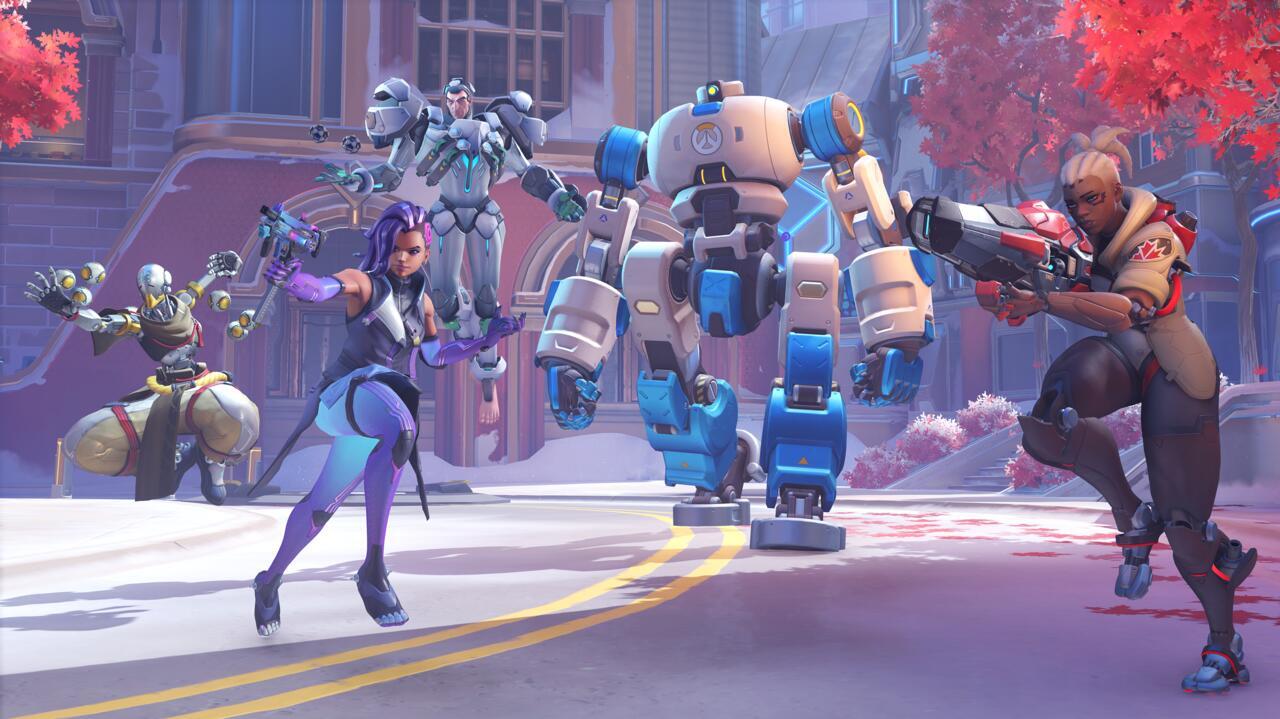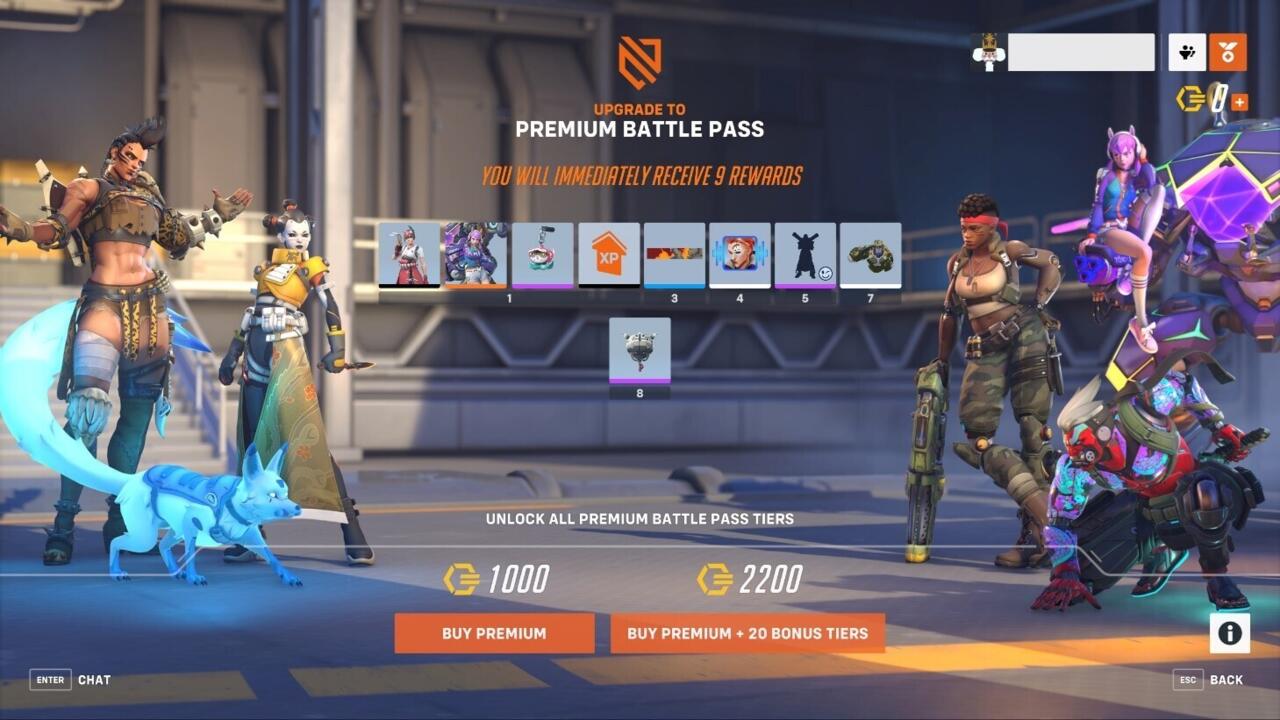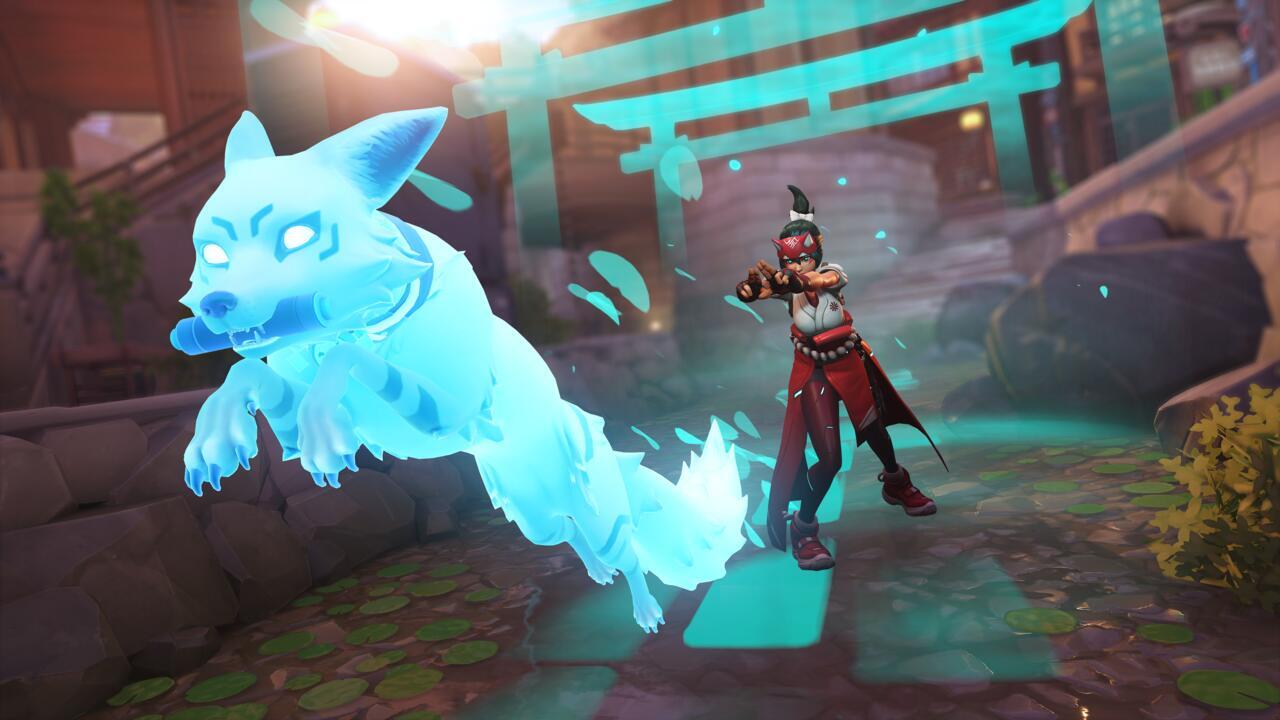There are few moments of calm in Overwatch 2. The action is closer, louder, and faster, and the voice lines are quippier and happen more often. However, in that brief period between selecting your hero and the barriers opening, unleashing you and your teammates out onto the battlefield, there is a brief window of peace--a split-second for meditation.
It was during these moments, as I watched my beloved Hana Song (aka D.Va) shift her weight from one side of her mecha to the other before offering a sweet "annyeong" to a teammate, I forgot I was playing Overwatch 2. Since its release in 2016, a lot has changed in Overwatch. But in these small, surreal moments, it all felt as if nothing had.
With 700 hours invested into the first Overwatch, what I longed for from Overwatch 2 was a lot of meaningful changes that pushed the series forward while also remaining faithful to the identity it first forged--the identity which made me, someone not typically interested in games driven solely by their multiplayer elements, such a big fan of the first Overwatch. In some ways, Overwatch 2 delivers this, offering up new characters that feel at home among the rest of the seasoned roster, making the jump to 5v5, and adding an enthralling Push mode. Even better, the game does all this while retaining the same artistry, compelling back-and-forth flow of battle, and core gameplay that fans love. However, these are tweaks and additions in a game that, otherwise, feels very familiar, and that sameness can oftentimes make this new Overwatch feel more like an update than the something new the "2" suggests. Beyond that, however, Overwatch 2 also often feels detached from the principles and charm of the original.

One of the most significant changes to Overwatch 2 comes in the shape of its new 5v5 combat. While Overwatch featured six heroes on each team--generally two damage, two support, and two tanks--Overwatch 2 eliminates one of these tanks, shrinking each team by one and, subsequently, altering the dynamic of battles. Little side scraps are nowhere near as common, as with only one tank soaking up damage, it becomes vital that the whole team is there to support them as well as provide enough of an attack to break through the other team's defenses. At times, this can be frustrating, as some tanks are far better at staying put and soaking up damage (Reinhardt) while others are better at hunting down enemies and dishing it out (Roadhog).
With two tanks, you could incorporate both types on your team, easing the need for a tank to juggle doing both. However, the change makes for faster and more concentrated matches, where cooperation and coordination are crucial, and your every action (or inaction) feels a lot more impactful. It also means team composition and understanding how certain heroes complement one another matters far more than ever before. This is as intense as it sounds, but the chaos and split-second strategizing also make it incredibly fun, with every secured victory a meaningful triumph.
Adding to Overwatch 2's focus on creating engaging and tense matches is its newest mode: Push. In Push, each team is tasked with reaching the middle of the map, where a robot and two barriers, one on either side, await. When a team has secured the robot it begins to push the opposing team's barrier; whichever team covers the most ground at the end of the match is then crowned the winner. In every game I played, the push-and-pull of battle was incredibly tense, feeling like a constant series of tug-of-war where the tide could change at any moment. Playing a game of Overwatch has never felt quite as good as it does in Overwatch 2.
With all this intensity, it makes sense that Blizzard is going to extreme lengths to prevent cheating and eliminate toxicity within the Overwatch community. This includes things such as requiring players to register a phone number with their Battle.net account, as well as eliminating one of Overwatch's prized features: Medals. These are no longer doled out at the end of each game and instead you only see the coveted Play of the Game reel followed by your individual experience bar filling up. However, you can see how your stats stack up against your teammates and enemies at any time with the touch of a button--making the elimination of medals seem pointless. For me, the satisfaction of earning a medal (or even being “on fire” during a match, another feature dropped in the sequel) was a huge incentive as they made me want to grow as a player and helped me identify when certain teammates or opponents were showing off some serious skills. This also contributed to how I gave out commendations. It's a subtle omission, but one that I certainly felt.
However, it's hardly the most significant change to Overwatch's reward systems. With Overwatch 2's pivot to free-to-play also comes the introduction of a very divisive feature in gaming: the battle pass. Instead of randomized loot boxes, Overwatch 2 will offer players cosmetic upgrades through its battle passes, which last an entire nine-week long season. These battle passes come in free and premium versions, with the premium pass costing 1,000 Overwatch Coins or $10 USD.
While I stand by the belief that randomized loot boxes can be predatory, preying upon people's willingness to essentially gamble for whatever prizes they want, it's harder for me to decide just how consumer-friendly these particular battle passes feel. Blizzard tries to curtail the notion that buying the premium battle pass is essential by touting that all new heroes--which are scheduled to release every other season--will always be available for free. However, everyone who does pay for the premium battle pass will get these heroes instantly, while those who don't will have to level their battle pass to tier 55 to unlock them.
In my time playing the game, the battle pass didn't level up all that quickly, despite me performing decently in most matches and even knocking out some of the game's new challenges. This means players are in for a long wait if they don't buy the premium pass and will need to invest a lot time into unlocking levels, which feels unfair even with Blizzard opting to keep new characters out of Competitive PvP play for the first few weeks. Sure, much like in Fortnite, it is possible to earn currency through the battle pass that reduces the cost of a future premium upgrade--which could be the smartest way to go about it if you're planning on doing a whole lot of playing. But parts of this feel so at odds with the spirit of the original Overwatch, which prided itself on not placing heroes behind paywalls and keeping playing fields level.

In addition, the brief look I got at seasons two, three, and four show a great deal of effort is going into themed seasons boasting exclusive cosmetics, with the more elaborate of these being locked behind paywalls. While the loot boxes at least had some semblance of equality in that you could get any item at random, this new model means players will have to spend money on a premium battle pass or buy an item outright if they wish to dress to impress.
Another thing to consider is that, for those jumping into Overwatch 2 without having owned the original Overwatch, it has now been revealed that you will have to play through 100 matches before you are able to use the entire roster of characters--a choice I find completely bizarre, even if I do understand the intentions behind it. The team calls this decision part of the game's First Time User Experience, which is meant to slowly onboard and acclimate new players to the game as well as prevent smurf accounts from becoming a problem. However, the idea that players need to log in 10 to 20 hours and prove themselves in order to unlock other heroes feels unnecessary and perhaps even a bit insulting. This is once again a thing that doesn't feel in the spirit of Overwatch, which encouraged players to explore and experiment freely to find what they feel works best for them; that ethos feels disingenuous now, considering that a chunk of the roster is locked away.
This is hardly the only issue at launch, however. While my time spent playing Overwatch 2 prior to release was difficult due to the small number of people playing the game, upon launch slight frustration gave way to annoyance. At times, it would take me hours to log into the game only to be kicked out after a match. This isn’t to mention the number of difficulties those around me reported, including accidentally purchasing skins, data transfer issues, and difficulties around Overwatch 2’s previous SMS requirements. While many live service games have bumpy beginnings, this forray felt especially jarring. It is worth noting, however, that Blizzard has been actively working on addressing these issues. Server queue times are down significantly, the SMS requirement has been dropped for the majority of players, and on at least three separate occasions the servers have been briefly shut down for maintenance, with noticeable improvements after each update.
Overwatch 2’s lack of PvE at launch is also a notable omission. Considering this aspect of the game was meant to be the groundbreaking, monumental feature that set it apart from its predecessor, it's not merely disappointing to have to wait until next year to see it; it makes the sequel feel more like an update simply packaged as a whole new chapter. Additionally, launching the game with PvE would have added some much needed heart and identity to the game that, despite how good it is to play, feels like an exercise in making Overwatch fall in line with the modern business models for multiplayer shooters. Sure, that might come off as a cynical assessment, but it feels just as cynical as it sounds. From doing away with Winston's inspiring opening speech, which very much speaks to the heart and soul of what Overwatch represents, to the sleek, almost overly-polished new style of the game's menu, to going free-to-play and implementing a battle pass, Overwatch 2 takes the franchise from a genre-defining shooter to a trend-chasing one. As such, it has begun to feel less like a unique sci-fi, superhero comic book in video game form, and more like, well, a lot of other games. That's not necessarily a bad thing, as many of those other games are superb in their own right and Overwatch 2's gameplay certainly lets it hang with the cream of the crop, but it comes at the cost of Overwatch's unique aesthetic and fascinating world, which feel diminished.
Fortunately, Overwatch 2 has a major silver lining in its characters. The subtle changes that older characters have undergone, both cosmetically and in terms of their abilities, feel beneficial and succeed in giving them that gentle refresh they needed without disturbing the magic of their original designs. Although it might take some getting used to not having some key abilities (I admit, I miss Orisa's barrier), the push towards making tanks better at dealing damage and less reliant on shields makes playing them a blast and adds to the more aggressive nature of Overwatch 2.
Similarly, characters like Sombra and Cassidy now hit harder, while heroes with stuns and freeze attacks no longer bring games to a grinding halt, and instead have abilities that keep the game going and damage numbers going up. Even with all these changes, the roster still seems to be fairly balanced, an impressive feat when you have 30+ characters to consider. And, as a newly-converted live service title, we can thankfully anticipate this to stay true. While there are sure to be some growing pains as players grow accustomed to changes occurring more frequently—and their favorite characters at times being unavailable to play—it could make for a healthier game with greater longevity.
I also cannot sing enough praises for each of the three new heroes, all of which are excellently designed and extremely versatile. Sojourn is a tactical one-woman army, while Junker Queen's enemy-weakening abilities give the tanky powerhouse a supportive edge. Kiriko in particular feels like no other support hero before her, as not only can she pass through walls in order to heal teammates, but she can also deal some serious damage with her kunai, making her a fantastic pick for folks who normally play the DPS role but need to take on a support role. Lastly, I also got a look at two heroes headed to Overwatch 2 in the coming seasons. Both of these heroes--while still subject to change--were excellently designed, and will add new elements to the game that make me excited to see how they fit in with the rest of the roster.

Where it counts, Overwatch 2 feels like a fantastic update to a multiplayer game with mechanics that enable thrilling skirmishes between teams of heroes. However, as a separate entity and sequel, it stumbles. Changes to the core gameplay are steps in the right direction, but it is surrounded by new points of friction where there previously were none. Thankfully, as a live-service game, things will be added or altered once Blizzard has more player feedback, so at the very least the studio has a strong foundation to build upon. There is plenty of good to be found in Overwatch 2 and in the heat of battle the intoxicating multiplayer dynamics that fans love are there to enjoy all over again. But if the first Overwatch taught me anything, it's to dream a bit bigger about what games can be, and there is still a bit more dreaming to be done here.